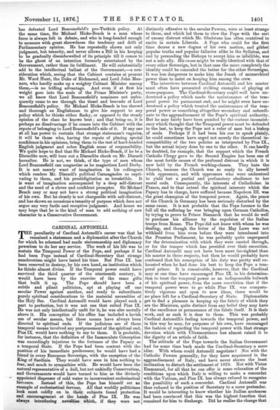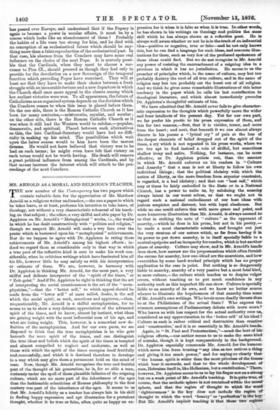CARDINAL ANTONELLI.
111.111, peculiarity of Cardinal Antonelli's career was that he remained a statesman and a diplomatist after the Church for which he schemed had made statesmanship and diplomacy powerless to do her any service. The work of his life was to sustain the Temporal Power of the Pope, and perhaps if he had been Pope instead of Cardinal-Secretary that strange anachronism might have lasted his time. But Pius IX. has been reserved to destroy, by his own hand, an institution which he thinks almost divine. If the Temporal power could have survived the third quarter of the nineteenth century, it would have been by the exercise of the same gifts that built it up. The Pope should have been a subtle and pliant politician, apt at playing off one secular Power against another, and ready to subordinate purely spiritual considerations to the material necessities of the Holy See. Cardinal Antonelli would have played such a part to perfection, but it was not one that suited Pius IX.
He was not only intellectually unfit for it, he was also morally above it. His conception of his office has included a lavish use of secular means, but these means have always been directed to spiritual ends. If the judicious use of these temporal means involved any postponement of the spiritual end, Pius IX. would have nothing to say to them. It is probable, for instance,. that the definition of the Immaculate Conception was exceedingly injurious to the fortunes of the Papacy as a temporal State. If the Pope had been content with the position of his immediate predecessor, he would have had a friend in every European Sovereign, with the exception of the King of Sardinia. They would have seen in him nothing to fear, and much to sympathise with. He would have been the natural representative of a dull, but not unkindly Conservatism, and Governments would have turned to him as the divinely appointed dispenser of cold water to inconvenient ecclesiastical fervours. Instead of this, the Pope has himself set an example of ecclesiastical fervour. All that worldly politicians look most coldly on in their subjects found protection and encouragement at the hands of Pius IX. He was always introducing novelties which, if they were not distinctly offensive to the secular Powers, were at least strange to them, and which led them to view the Pope with the sort of uneasy distrust which Mr. Gladstone has often contrived to excite in certain Liberals. A Pope who could for the first time decree a new dogma of his own motion, and gibbet popular truths and popular fallacies alike in the Syllabus, and end by persuading the Bishops to accept him as infallible, was not a safe ally. His cause might be really identical with that of every other Sovereign, but in that case the more completely the identity could be concealed the better for the other Sovereigns. It was less dangerous to make him the Jonah of monarchical power than to insist on keeping him among the crew.
The interviews between Cardinal Antonelli and his master must often have presented striking examples of playing at cross-purposes. The Cardinal-Secretary could well have un- derstood a policy which made the maintenance of the tem- poral power its paramount end, and he might even have un- derstood a policy which treated the maintenance of the tem- poral power as something altogether secondary and subordi- nate to the aggrandisement of the Pope's spiritual authority. But he may fairly have been puzzled by the curious inconsist- ency which thought that the Temporal power must be defended to the last, to keep the Pope not a ruler of men but a bishop of souls. Perhaps if it had been his cue to speak plainly, he could sometimes have urged not merely the theoretical in- compatibility of the two policies as interpreted by Pius IX., but the actual injury done by one to the other. It can hardly be doubted, for example, that the support which the French Catholic Clergy gave to the Second Empire has been one of the most fertile causes of the profound distrust in which it is now held by the French working-classes. They hate the Church, because the Church was so ready to ally herself with oppressors, and with oppressors who were understood to yield but a partial and perfunctory obedience to her moral code. Consequently, the interests of Catholicism in France, and to that extent the spiritual interests which the Papacy has in charge, have suffered because Napoleon III. was the great champion of the temporal power. Again, the peace of the Church in Germany has been seriously disturbed by the same cause. It is not probable that the Pope foresaw to the full all the suffering he was bringing upon German Catholics, by trying to prove to Prince Bismarck that he would do well to purchase his alliance by the expulsion of the Italian troops from Rome. The Pope did not know with whom he was dealing, and though the letter of the May Laws was not withheld from him even before they were introduced into. the Prussian Parliament, he was probably quite unprepared for the determination with which they were carried through, or for the temper which has presided over their execution. Cardinal Antonelli may not have been more far-sighted than his master in these respects, but then he would probably have confessed that his conception of his duty was pretty well ex- hausted when he had done his best to keep the Pope a tem- poral prince. It is conceivable, however, that the Cardinal may at one time have encouraged Pius IX. in his determina- tion to treat-the temporal power as an indispensable bulwark of his spiritual power, from the mere conviction that if the temporal power were to go while Pius IX. was compara- tively vigorous and open to new ideas, there would be no place left for a Cardinal-Secretary of State. Diplomatists get to find a pleasure in keeping up the fabric of which they are the Ministers, quite distinct from any belief they may have of the excellence or permanence of the fabric itself. It is their work, and as such it is dear to them. This was probably Cardinal Antonelli's feeling towards the temporal power, and in this way he may, for purposes of his own, have encouraged the fashion of regarding the temporal power with that strange devotion which with Ultramontanes has almost raised it to the dignity of an article of faith.
The attitude of the Pope towards the Italian Government had for some time back made the Cardinal-Secretary a mere idler. With whom could Antonelli negotiate ? Not with the Catholic Powers generally, for they have acquiesced in the aggrandisement of Italy, and have never shown the least inclination to disturb the settlement of 1870. Not with Victor Emmanuel, for all that he can offer is some relaxation of the conditions upon which Italy is willing to make a concordat with the Vatican, and Pius IX. has always refused to recognise the possibility of such a concordat. Cardinal Antonelli was thus reduced to the position of Secretary to a mere pretender. It would be interesting to know whether his Italian acuteness had been convinced that this was the highest function that remained for him to discharge. Did he realise the change that
has passed over Europe, and understand that if the Papacy is again to become a power in secular affairs, it must be by a course which looks like an abandonment of them ? Probably the habits of a life were too strong for him, and he died with no conception of an ecclesiastical future which should be any- thing more than a faint reproduction of the ecclesiastical past. In that case, his absence from the Conclave may have some real influence on the choice of the next Pope. It is scarcely possi- ble that the Cardinals, when they meet to choose a suc- cessor to Pius IX., should proceed as though they had only to provide for the devolution on a new Sovereign of the temporal function which preceding Popes have exercised. They will at least see that they have to make their choice between a fresh struggle with an inexorable fortune and a new departure in which the Church shall once more appeal to the classes among which her earliest victories were won. To all appearance, the future of Catholicism as an organised system depends on the decision which the Conclave comes to when this issue is placed before them. On the one side, there is the Roman Catholic Church as it has been for many eenturies,—arietocratic, royalist, and secular ; on the other side, there is the Roman Catholic Church as it was when it still had the Western world to subdue,--popular, democratic, and spiritual. Placed between such alternatives as this, the late Cardinal-Secretary would have had no diffi- culty in making up his mind. The possibilities which wait upon the latter course would to him have been the merest dreams. He would. not have believed that victory was to be had on such terms ; he might even have felt that victory on such terms would not be worth having. His death will remove a great political influence from among the Cardinals, and by that means increase the interest which will attach to the pro- ceedings of the next Conclave.

































 Previous page
Previous page